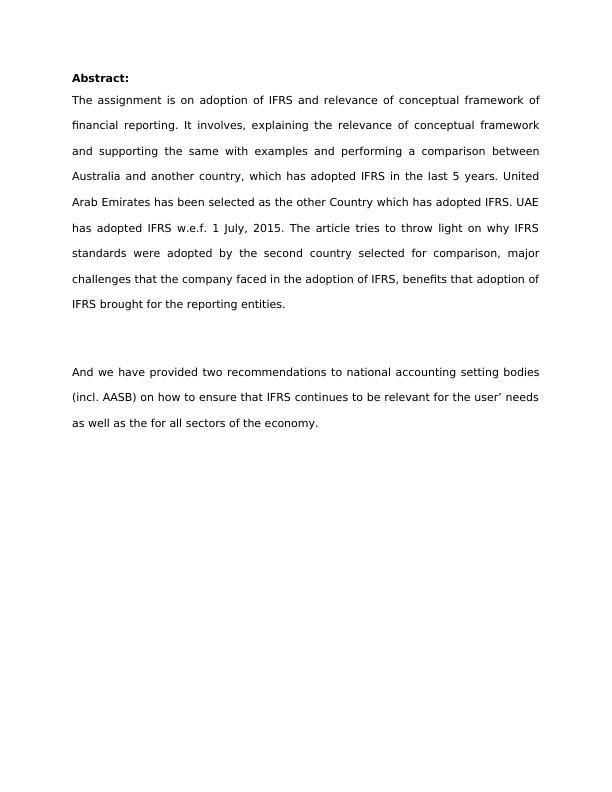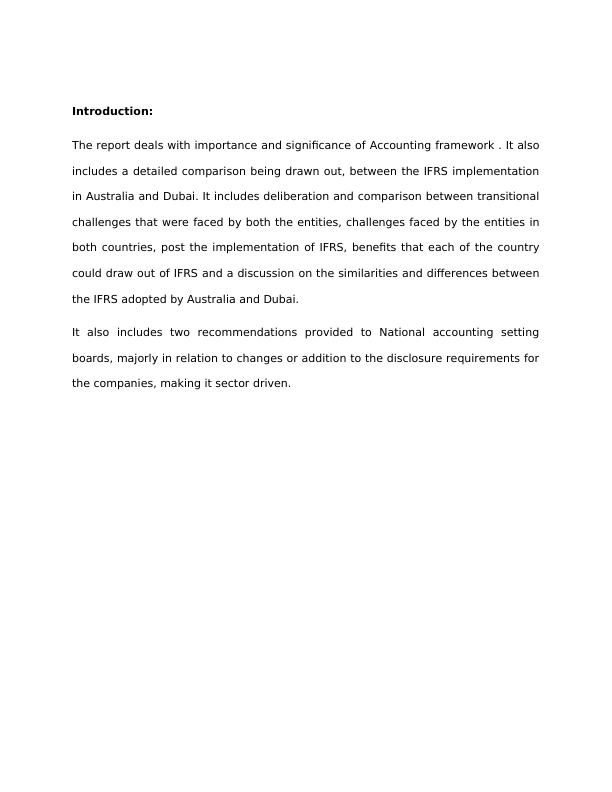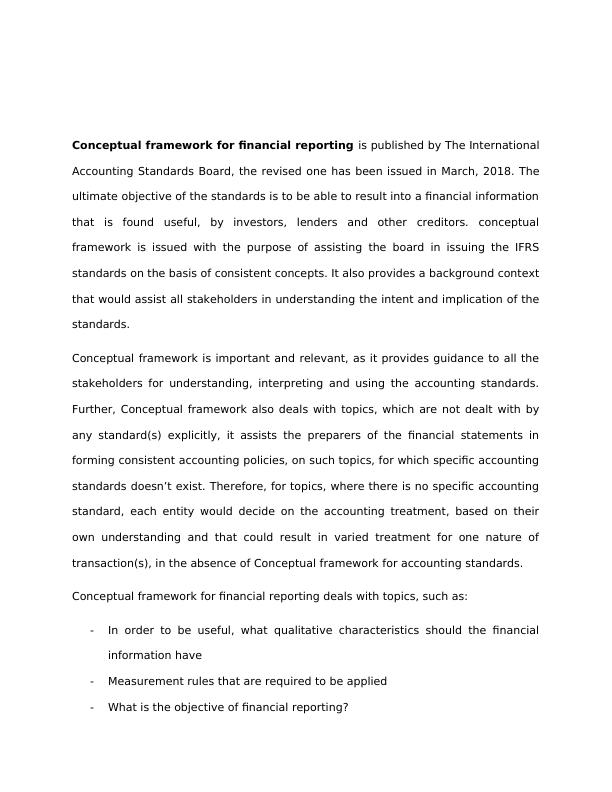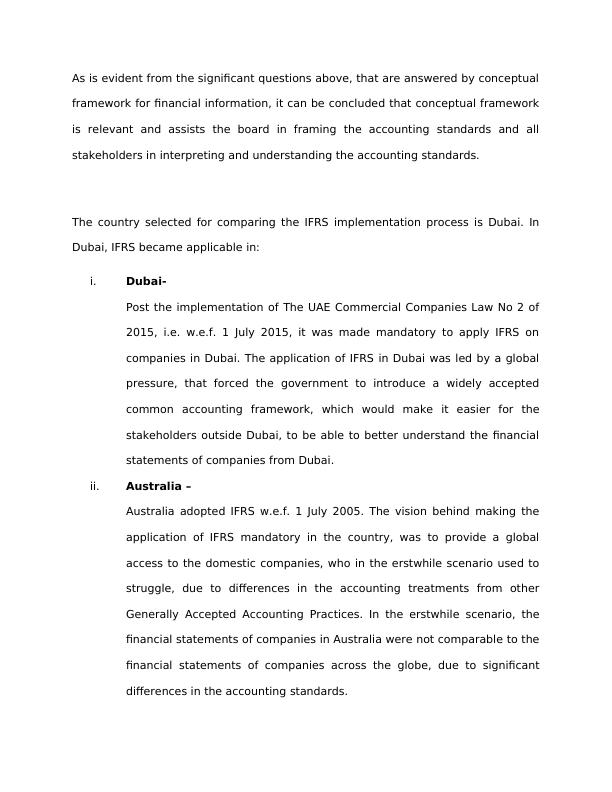Adoption of IFRS and Relevance of Conceptual Framework of Financial Reporting
Added on 2022-11-16
17 Pages3684 Words427 Views
Abstract:
The assignment is on adoption of IFRS and relevance of conceptual framework of
financial reporting. It involves, explaining the relevance of conceptual framework
and supporting the same with examples and performing a comparison between
Australia and another country, which has adopted IFRS in the last 5 years. United
Arab Emirates has been selected as the other Country which has adopted IFRS. UAE
has adopted IFRS w.e.f. 1 July, 2015. The article tries to throw light on why IFRS
standards were adopted by the second country selected for comparison, major
challenges that the company faced in the adoption of IFRS, benefits that adoption of
IFRS brought for the reporting entities.
And we have provided two recommendations to national accounting setting bodies
(incl. AASB) on how to ensure that IFRS continues to be relevant for the user’ needs
as well as the for all sectors of the economy.
The assignment is on adoption of IFRS and relevance of conceptual framework of
financial reporting. It involves, explaining the relevance of conceptual framework
and supporting the same with examples and performing a comparison between
Australia and another country, which has adopted IFRS in the last 5 years. United
Arab Emirates has been selected as the other Country which has adopted IFRS. UAE
has adopted IFRS w.e.f. 1 July, 2015. The article tries to throw light on why IFRS
standards were adopted by the second country selected for comparison, major
challenges that the company faced in the adoption of IFRS, benefits that adoption of
IFRS brought for the reporting entities.
And we have provided two recommendations to national accounting setting bodies
(incl. AASB) on how to ensure that IFRS continues to be relevant for the user’ needs
as well as the for all sectors of the economy.

Introduction:
The report deals with importance and significance of Accounting framework . It also
includes a detailed comparison being drawn out, between the IFRS implementation
in Australia and Dubai. It includes deliberation and comparison between transitional
challenges that were faced by both the entities, challenges faced by the entities in
both countries, post the implementation of IFRS, benefits that each of the country
could draw out of IFRS and a discussion on the similarities and differences between
the IFRS adopted by Australia and Dubai.
It also includes two recommendations provided to National accounting setting
boards, majorly in relation to changes or addition to the disclosure requirements for
the companies, making it sector driven.
The report deals with importance and significance of Accounting framework . It also
includes a detailed comparison being drawn out, between the IFRS implementation
in Australia and Dubai. It includes deliberation and comparison between transitional
challenges that were faced by both the entities, challenges faced by the entities in
both countries, post the implementation of IFRS, benefits that each of the country
could draw out of IFRS and a discussion on the similarities and differences between
the IFRS adopted by Australia and Dubai.
It also includes two recommendations provided to National accounting setting
boards, majorly in relation to changes or addition to the disclosure requirements for
the companies, making it sector driven.

Conceptual framework for financial reporting is published by The International
Accounting Standards Board, the revised one has been issued in March, 2018. The
ultimate objective of the standards is to be able to result into a financial information
that is found useful, by investors, lenders and other creditors. conceptual
framework is issued with the purpose of assisting the board in issuing the IFRS
standards on the basis of consistent concepts. It also provides a background context
that would assist all stakeholders in understanding the intent and implication of the
standards.
Conceptual framework is important and relevant, as it provides guidance to all the
stakeholders for understanding, interpreting and using the accounting standards.
Further, Conceptual framework also deals with topics, which are not dealt with by
any standard(s) explicitly, it assists the preparers of the financial statements in
forming consistent accounting policies, on such topics, for which specific accounting
standards doesn’t exist. Therefore, for topics, where there is no specific accounting
standard, each entity would decide on the accounting treatment, based on their
own understanding and that could result in varied treatment for one nature of
transaction(s), in the absence of Conceptual framework for accounting standards.
Conceptual framework for financial reporting deals with topics, such as:
- In order to be useful, what qualitative characteristics should the financial
information have
- Measurement rules that are required to be applied
- What is the objective of financial reporting?
Accounting Standards Board, the revised one has been issued in March, 2018. The
ultimate objective of the standards is to be able to result into a financial information
that is found useful, by investors, lenders and other creditors. conceptual
framework is issued with the purpose of assisting the board in issuing the IFRS
standards on the basis of consistent concepts. It also provides a background context
that would assist all stakeholders in understanding the intent and implication of the
standards.
Conceptual framework is important and relevant, as it provides guidance to all the
stakeholders for understanding, interpreting and using the accounting standards.
Further, Conceptual framework also deals with topics, which are not dealt with by
any standard(s) explicitly, it assists the preparers of the financial statements in
forming consistent accounting policies, on such topics, for which specific accounting
standards doesn’t exist. Therefore, for topics, where there is no specific accounting
standard, each entity would decide on the accounting treatment, based on their
own understanding and that could result in varied treatment for one nature of
transaction(s), in the absence of Conceptual framework for accounting standards.
Conceptual framework for financial reporting deals with topics, such as:
- In order to be useful, what qualitative characteristics should the financial
information have
- Measurement rules that are required to be applied
- What is the objective of financial reporting?

As is evident from the significant questions above, that are answered by conceptual
framework for financial information, it can be concluded that conceptual framework
is relevant and assists the board in framing the accounting standards and all
stakeholders in interpreting and understanding the accounting standards.
The country selected for comparing the IFRS implementation process is Dubai. In
Dubai, IFRS became applicable in:
i. Dubai-
Post the implementation of The UAE Commercial Companies Law No 2 of
2015, i.e. w.e.f. 1 July 2015, it was made mandatory to apply IFRS on
companies in Dubai. The application of IFRS in Dubai was led by a global
pressure, that forced the government to introduce a widely accepted
common accounting framework, which would make it easier for the
stakeholders outside Dubai, to be able to better understand the financial
statements of companies from Dubai.
ii. Australia –
Australia adopted IFRS w.e.f. 1 July 2005. The vision behind making the
application of IFRS mandatory in the country, was to provide a global
access to the domestic companies, who in the erstwhile scenario used to
struggle, due to differences in the accounting treatments from other
Generally Accepted Accounting Practices. In the erstwhile scenario, the
financial statements of companies in Australia were not comparable to the
financial statements of companies across the globe, due to significant
differences in the accounting standards.
framework for financial information, it can be concluded that conceptual framework
is relevant and assists the board in framing the accounting standards and all
stakeholders in interpreting and understanding the accounting standards.
The country selected for comparing the IFRS implementation process is Dubai. In
Dubai, IFRS became applicable in:
i. Dubai-
Post the implementation of The UAE Commercial Companies Law No 2 of
2015, i.e. w.e.f. 1 July 2015, it was made mandatory to apply IFRS on
companies in Dubai. The application of IFRS in Dubai was led by a global
pressure, that forced the government to introduce a widely accepted
common accounting framework, which would make it easier for the
stakeholders outside Dubai, to be able to better understand the financial
statements of companies from Dubai.
ii. Australia –
Australia adopted IFRS w.e.f. 1 July 2005. The vision behind making the
application of IFRS mandatory in the country, was to provide a global
access to the domestic companies, who in the erstwhile scenario used to
struggle, due to differences in the accounting treatments from other
Generally Accepted Accounting Practices. In the erstwhile scenario, the
financial statements of companies in Australia were not comparable to the
financial statements of companies across the globe, due to significant
differences in the accounting standards.

End of preview
Want to access all the pages? Upload your documents or become a member.
Related Documents
Accounting Theory and Current Issueslg...
|12
|3126
|228
Accounting Theory And Current Issues Reportslg...
|13
|4004
|21
Accounting Theory and Current Issues | Assignment samplelg...
|15
|3962
|56
Accounting Theories and Current Issueslg...
|18
|4645
|92
Adoption of IFRS: A critical reviewlg...
|9
|3563
|380
Adoption of IFRS: A Critical Reviewlg...
|11
|4371
|1
